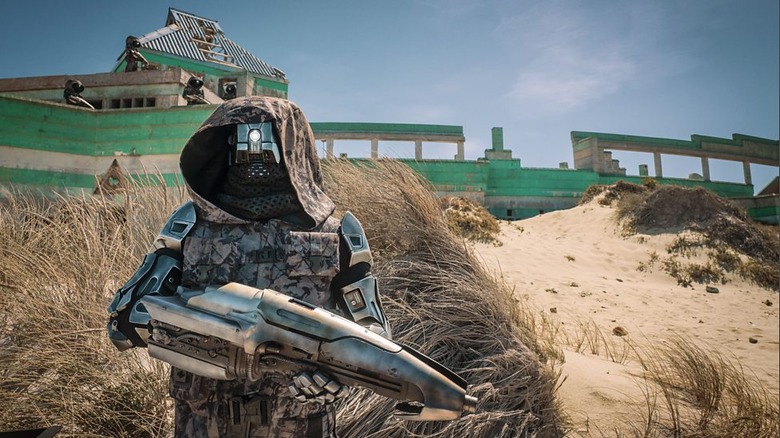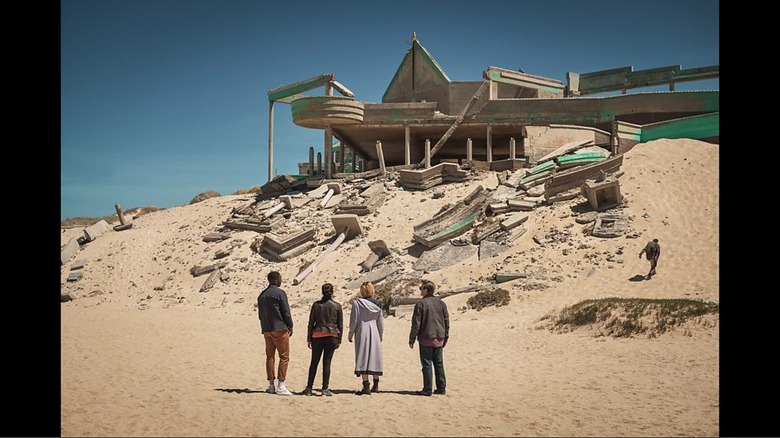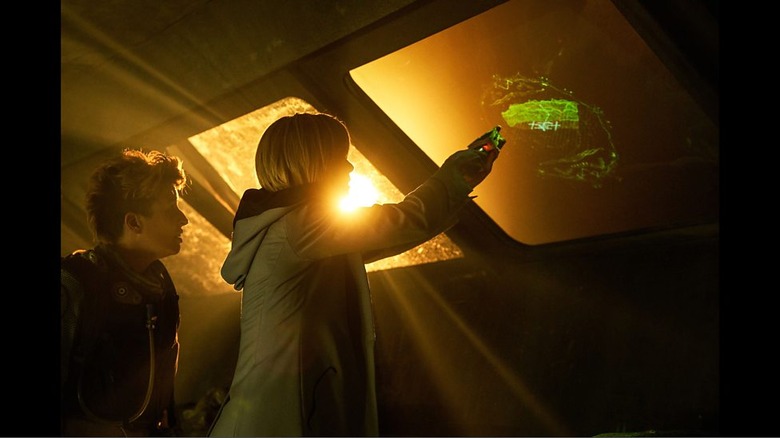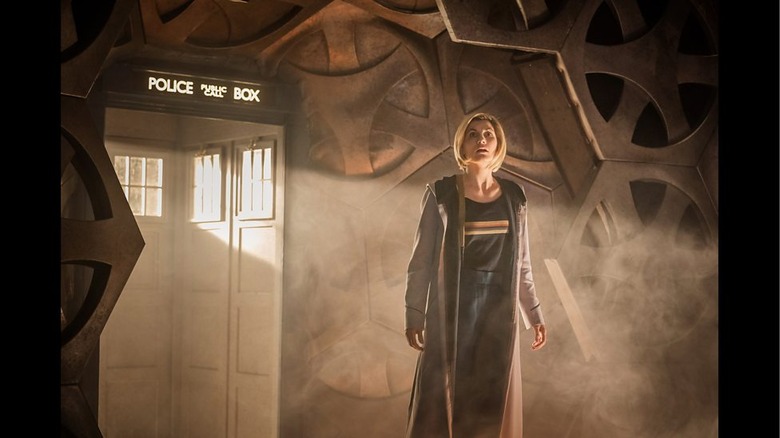'Doctor Who' Races To Establish A New Era With "The Ghost Monument"
Well, I asked for something more visually impressive, and I got it. "The Ghost Monument" might be the most cinematic episode of Doctor Who yet, with the BBC likely pouring lots of money into those sweeping drone shots and the on-location shoot in South Africa. Where the charming but mostly competent season premiere felt almost suffocatingly small, the second episode of season 11 balloons out with an episode centering on an intergalactic space race. As for whether the episode's narrative catches up with its ambitious premise, well, I'll get to that later.
This season already feels unlike any season of Doctor Who before — but as for exactly how to describe this new era of the show, I'm kind of at a loss. Jodie Whittaker's debut episode as the 13th Doctor was a slow-to-unfold, character-driven drama, while "The Ghost Monument" is all rolling sand dunes and blockbuster-inspired storylines. But perhaps what new showrunner Chris Chibnall is bringing to Doctor Who is an undercurrent of scrappiness. Whittaker's Doctor is less in control and more prone to scrambling for a solution than her predecessors — making the series more exciting and alien than ever. Welcome to the truly modern Doctor Who, replete with shaky handheld, grimy settings, and extreme close-ups. But while director Mark Tonderai piles on the lavish visuals, Chibnall's script for "The Ghost Monument" is sadly a little lightweight.
Running Woman
The Hunger Games meets Running Man in "The Ghost Monument," which picks up right after that tense cliffhanger that found the Doctor and her new friends beamed into the vacuum of outer space. They're quickly scooped up by two spaceships, both searching for the lost planet Desolation. Separated into two groups, the Doctor, Yaz (Mandip Gill), Ryan (Tosin Cole), and Graham (Bradley Walsh) meet the spaceships' respective pilots, the tough-talking survivor Angstrom (Susan Lynch) and the mistrustful Epzo (Shaun Dooley), both of whom are engaged in a bitter competition for the greatest reward in the universe. Upon landing on Desolation (or in the case of Epzo, the Doctor and Yaz, crashing), the group gets pulled into "the final stage of the last ever rally of the 12 galaxies," which is run by a mysterious wealthy man named Ilin (Art Malik).
It's a promising premise for an episode that ends up feeling like half a blockbuster crammed into a 50-minute episode. The entire episode is one long race toward the titular "Ghost Monument," which is revealed to be the Doctor's TARDIS. The gang — who get reunited fairly quickly in a missed opportunity for some meaty character-building — join in on the race across Desolation after the Doctor eagerly promises to get them home safely. Despite some riveting action set pieces with robot guards (seemingly modeled none too obviously off Stormtroopers), there's something missing from this episode. Maybe it's the various intriguing narrative threads that the episode picks up and doesn't quite follow through with — Angstrom and Epzo, despite some pensive character moments, feel underdeveloped; the crowded ensemble leaves Yaz little room to shine; and the revelation that the planet once housed a thriving civilization that was reduced to dust through the development of weapons of war is kind of hand-waved away. My biggest issue with this episode is that it never takes full advantage of its epic visual scope, leaving the Doctor to spend much of her dialogue spouting exposition. It's a classic case of telling and not showing, which feels odd in an episode that looks as good as this.
But despite its storytelling pitfalls, "The Ghost Monument" — like the season premiere — is full of enough delightful Doctor-y moments (the Audrey Hepburn/Pythagorus sunglasses!) and character drama to remain an enjoyable episode of Doctor Who. Again, Whittaker's Doctor remains a ray of sunshine, establishing herself further as the most human, and helpful, Doctor we've had in a while.
Family Matters
Ryan and Graham's tête-à-tête offers a quiet breather for the episode, and some much-needed character development for a group that still came together a little too easily. Aside from some short-lived befuddlement at appearing on an alien planet for the first time, Ryan, Yaz, and Graham fall into step with the Doctor so quickly that I wish this episode would give them a little more time to figure out their dynamic. The only point of conflict we get between the Doctor and her human friends is when Ryan blatantly ignores her no guns rule, only for that to immediately backfire. Still, we do get a juicy glimpse into Ryan and Graham's tense dynamic as Ryan continues to mourn his grandmother while coldly brushing aside Graham's attempts to get him to call him "Granddad." With the necessary time spent to delve into Epzo's abused childhood and Angstrom's past as a survivor of a conquered planet, Yaz is unfortunately left on the sidelines.
The season's focus on character does draw attention in something that the Chibnall era has been notably lacking in compared to Steven Moffat and even Russell T. Davies' era: whimsy. The hammy jokes are few and far between, with "The Ghost Monument" especially leaning into the season's more grounded, less goofy vibe.
"Stronger Together"
"You lead, but you're scared to," the episode's monsters, in the forms of sentient pieces of cloth, taunt Whittaker's Doctor. "Yeah, well, who isn't?" she replies.
The episode's Big Bads sound pretty lame on paper, but the sentient cloths are the the season's first genuinely creepy monsters, over last week's toothy Stenza warrior. Though in concept they're not unlike previous civilization-destroying Doctor Who monsters like the Vashta Nerada, the unnamed living cloths' tendency to strangle and crush their victims is some disturbing stuff. Plus when they talk, they look and sound a bit like Dementors from Harry Potter, so that adds to the overall ambience. Speaking of the Stenza, the second mention of them this episode points to the warrior alien race being the Big Bad of the season, which is a tad disappointing. Despite the creepy teeth feature, the Stenza warrior was an underwhelming one-episode monster, which doesn't bode well for the overall season. Chibnall had previously promised that season 11 wouldn't have a season-long arc, but that seems to have been put to bed with the Stenza reference and the mention of the "Timeless Child," which provoked quite a reaction from the Doctor. Cue fan theories for the return of Susan.
The episode gets neatly wrapped with a dual race win for Epzo and Angstrom, who appear forever changed for the better after their stint with the Doctor. But the pleasantly death-less episode ends on a dark (and kind of out-of-character) moment for the Doctor, who quickly grows dejected when Ilin abandons Team Earth on the planet. It seems like an excuse for the Doctor to be encouraged by her friends before the TARDIS miraculously materializes. But this scene plays well thanks to Whittaker's sublime performance — she excels in those little facial expressions that can transform from desperation, to sheer yearning, to awe at the drop of a hat. As she steps into her new TARDIS for the first time, I welled up with emotion — it felt like coming home.
Tidbits in Time and Space




